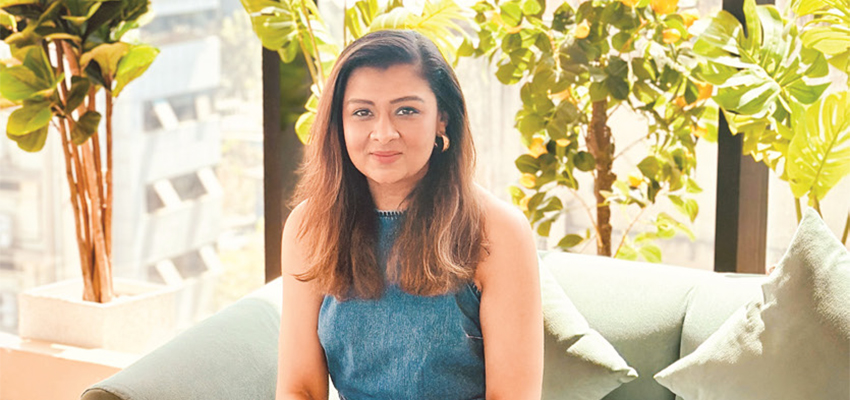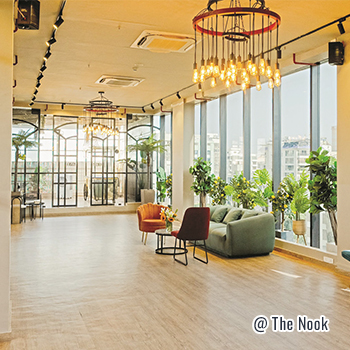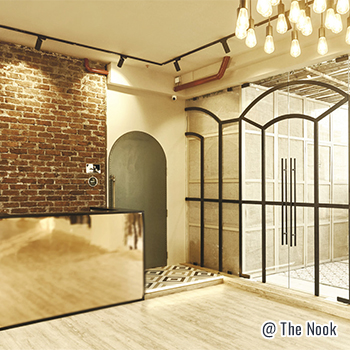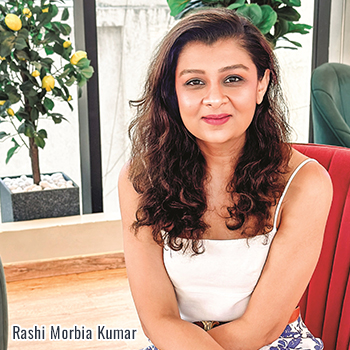Reinventing Business Latitudes

A fashion stylist and founder of The Nook, in Mumbai, Rashi Morbia Kumar, did not have any formal business education, but her commerce and fashion marketing background, and eons of extensive practical experience, have shaped her unique business outlook. Her initial work in fashion styling with renowned designers including Rocky S and Anaita Shroff Adajania, followed by a shift to event planning, demonstrates her adaptability. The journey of establishing a kids’ beauty salon, and The Nook, an innovative event space, showcases her resilience and creativity. In an interaction with Corporate Citizen, Rashi reveals how passion and reinvention can leverage business dynamics
A combination of education and hands-on learning has given Rashi Morbia Kumar, a unique perspective, blending creativity with strategic thinking in running her current business. Although her deep passion for fashion drove her to join the industry, Rashi did not aim to be a fashion designer. Like many she was sure of the industry she wished to build her career in, but was unsure of the path to take. When a friend introduced her to fashion marketing, the concept intrigued her and she decided to give it a shot. She enrolled in a one-year diploma course in Fashion Marketing at Berkeley College in New York—an express course that helped her understand the business side of fashion.
Rashi’s journey spells of different strokes across the fashion industry and her business reinventions in the hospitality and beauty sectors. Staying relevant has been her forte, even when she took a gap to fulfill her role as a mother, and her subsequent career comeback.
Corporate Citizen: How did the Fashion Marketing course in Berkeley, NYC, groom you?
Rashi Morbia Kumar: It was a one-year diploma programme. Beyond the Fashion Marketing curriculum, it helped build my confidence and improve my public speaking skills, which was huge for me since I’m naturally introverted and reserved. I also got a lot out of the personality development training, which boosted my social skills and helped me interact better with people. Overall, it was a good experience that played a big part in my personal growth.
I don't have a formal education in business, like an MBA, or any advanced degrees, my real learning has come from practical experience. However, the most valuable lessons have come from the ups and downs of real-life experience. I've made mistakes, faced failures and learned to identify and correct flaws over time.
CC: What triggered your career journey as a fashion stylist in the early stages of your career?
I was very intrigued by how clothes and style could transform someone's appearance and boost their confidence. After returning from New York in 2009, I discovered the world of fashion styling, which was a new and untapped opportunity at the time. It was a perfect blend of my love for fashion and a hands-on, creative approach. It helped me to pursue opportunities with various designers/ stylists in the industry, where I learned from their expertise and contributed my ideas.
"It’s crucial to strike a balance between passion and practicality. I also learned that no matter how promising your business idea is, it’s vital to stay actively involved and not assume that everything will run smoothly on its own"
-Rashi Morbia Kumar
CC: Who were your initial mentors in the industry?

I am undeniably grateful for the incredible privilege of working with some of the biggest names in the industry, starting with Rocky S, who himself has been a designer for the longest time and then got into styling as well. Working with him gave me a fantastic opportunity to truly understand how the industry works. I learned the ins and outs of styling, what it entails and how it operates.
CC: How did you gain an opportunity to style for Bollywood movies?
I had the amazing opportunity to assist Anaita Shroff Adajania and style multi-starrer movies with some of the biggest names in Bollywood. I learned a lot from Anaita—the way of working, the ethics, and the attention to detail, the presence of mind, and how to stay calm and confident on set. She is a brilliant stylist to this day, and I feel incredibly blessed to have worked with her. I then moved on to a startup called StyleCracker, which had a unique concept of offering styling advice and guidance to anyone who needed it, through experts and in real time. It was very intriguing and unique. I worked with them during their launch and had the amazing chance to work with Archana Walavalkar and Dhimaan Shah. The job taught me a lot about running a business, how startups work, and how to build a brand from the ground up.
CC: How did you bounce back after your four-year hiatus from the industry?
I took a break from styling for a few years and resumed in 2018 with Ami Patel. The shift from 2014 to 2018 felt like entering a completely different world. Everything had changed—the way the industry worked, the people, the rules, the social media game, and the exposure. It took me a while to get back into my zone and catch up with the pace. Ami is an amazing person, truly an inspiration. After my pregnancy, I explored the industry as an independent stylist and took on a few projects, which was pretty amazing. I continued working independently for a while, but I decided to end my journey as a stylist post-Covid.
CC: What inspired you to start Dolled and Dapper LLC in 2016? Wasn’t a beauty salon for kids too ahead of its time?
My husband and I were exploring various opportunities and ideas for a while, when I came across a similar concept abroad. It was unique, adorable, and quite unexplored in our market, so I thought, why not? On paper, it seemed like a fantastic idea, and in practice it turned out even better than we had imagined. However, it was ahead of its time, and our business calculations didn’t quite align with our initial plans. Despite the challenges, it was a valuable learning experience. We created something truly special with Dolled and Dapper, and it will always be a meaningful part of our journey.
CC: How difficult or easy was it to manage your first enterprise?
Managing my first enterprise was both challenging and rewarding. Financially, it required careful budgeting and resource management to ensure sustainability. Growth came with its own set of obstacles, including building a client base and scaling operations. However, these challenges provided invaluable learning experiences and laid a strong foundation for future success.
Starting a business is a rollercoaster. There have been times when I questioned everything, but I’ve learned that setbacks are setups for comebacks. It’s easy to get discouraged when you see others succeeding, but I’ve found that focusing on my journey has been more rewarding. Every challenge is a chance to grow, and I’m constantly striving to learn and improve. It’s not always easy, but it’s worth it.
CC: What were your learnings from running the kid’s parlour and the aftermath?
If you become too emotionally attached to your idea, it might make you resistant to feedback or hesitant to pivot when necessary. Being overly attached can make it harder to see when something isn't working or when a change is needed. It's crucial to strike a balance between passion and practicality. I also learned that no matter how promising your business idea is, it’s vital to stay actively involved and not assume that everything will run smoothly on its own.
CC: Is there a good age/time to set up entrepreneurship?
I think it's more about being ready than being a certain age. You could be 25 with a million- dollar idea, or 50 with the experience to back it up. The key is to have a burning passion and be prepared to put in the work. For me, the time was right when I realised I couldn't imagine doing anything else.
"Whether in beauty services or event hosting, attention to detail is crucial. Ensuring high standards in every aspect, from ambience to service delivery, was a shared priority"
CC: How did you stay motivated during your career break in 2019 to 2022?

It was tough, I didn't know what direction to take, I had the fear of failing, or of quitting because things might get tough. I delivered a baby as well, and right after that, Covid hit and everything intensified. It was difficult for couple of years, extremely challenging mentally, physically, emotionally and financially. It's not been smooth sailing, for sure. I kept pushing myself and received tremendous support from my family and friends, who motivated me and kept me going through the tough times. Their support helped me navigate through those harsh years, and eventually, I found my path to establish my next venture, The Noo’.
CC: What inspired you to start The Nook?
I've always been passionate about creating beautiful and functional spaces, and interiors. My fashion industry background has inculcated my keen eye for detail and aesthetics, which naturally extended to my love for interior design. I wanted to do something fun and unique that could bring joy to others, so I decided to start with a small space and introduce the concept in Mumbai.
CC: What were the challenges in setting up The Nook?
Setting it up in the hospitality sector presented a unique set of challenges compared to Dolled and Dapper in the beauty sector. The hospitality sector requires numerous licenses and permits, including those for alcohol, food safety, and event hosting. Navigating these regulatory requirements was time-consuming and complex. Creating a versatile event space involved significant investment in infrastructure, including designing indoor and outdoor areas, ensuring accessibility, and maintaining aesthetic appeal.
CC: Can you compare your experience in running the kid’s parlour and in the hospitality space?
Unlike the beauty sector, hospitality requires coordinating multiple services like catering, decoration and entertainment. Establishing a reliable network of partners was crucial. Although some similarities made the process comparatively easier, both ventures required a deep understanding of customer needs and preferences. Whether in beauty services or event hosting, attention to detail is crucial. Ensuring high standards in every aspect, from ambience to service delivery, was a shared priority. My passion for creating beautiful, functional spaces and delivering exceptional experiences drove both ventures. A clear vision and dedication helped in overcoming the challenges.
TIPS FOR ASPIRING BUSINESSWOMEN
- Prioritise and delegate: Learn to say no and focus on what truly matters. Delegate tasks whenever possible, both at home and at work.
- Set boundaries: Establish clear work-life boundaries and stick to them as much as possible. This includes setting specific work hours and creating a dedicated workspace.
- Self-care: Prioritise your physical and mental health. This includes exercise, nutrition and relaxation techniques.
- Seek support: Build a strong support system of family, friends, or childcare providers. Don’t hesitate to ask for help when needed.
- Flexible work arrangements: Consider flexible work options like remote work or part-time schedules to accommodate family responsibilities.
- Quality time: Make the most of your time with your children. Create quality moments and cherish them.
- Celebrate small wins: Recognise and appreciate your accomplishments, both personally and professionally.
"The obstacles I faced weren’t because of my gender but rather due to the complex nature of running a business in India. The process is very layered, with numerous hurdles to navigate. It took me some time to learn and get the hang of things"
CC: How profitable is the hospitality space sector with 5-star hotels and corner boutique restaurants doing something similar?

It is quite profitable, and exciting in the way it continues to evolve. While 5-star hotels and boutique restaurants are prominent players in this space, our venue stands out because of its unique approach. Our space caters to clients looking for unconventional settings rather than the standard hotel or restaurant experience. The ability to customise events according to specific needs and preferences, combined with the privacy and wide range of catering options we provide, sets us apart. Our profitability relies on our diverse clientele looking for something special.
CC: What is the future for space hospitality in the next five years?
With an increasing demand for unique, luxurious and versatile event spaces, we anticipate significant growth in this sector. Clients are seeking more personalised and memorable experiences, and spaces like ours are perfectly positioned to meet these needs. As for being in the organised sector, The Nook already operates within a structured and professional framework. The trend is expected to continue, with more venues adopting organised practices to ensure consistency, quality and excellent customer service.
CC: How have you juggled motherhood and your businesses?
Balancing motherhood and a demanding business or working as a stylist is undoubtedly challenging. It's a constant juggle of priorities, and there's often a sense of guilt, whether it's for nots spending enough time with your kid or not giving enough attention to the business. It's a delicate balance requiring immense strength, support, and understanding from your family. However, the satisfaction of building a successful career while nurturing a family is incredibly rewarding.
CC: Did being a woman add to your business challenges?
I’ve been blessed in that regard; being a woman hasn’t made it particularly challenging for me. The obstacles I faced weren’t because of my gender but rather due to the complex nature of running a business in India. The process is very layered, with numerous hurdles to navigate. It took me some time to learn and get the hang of things. Overcoming these challenges required gaining experience and understanding the unique ways of working in this environment.